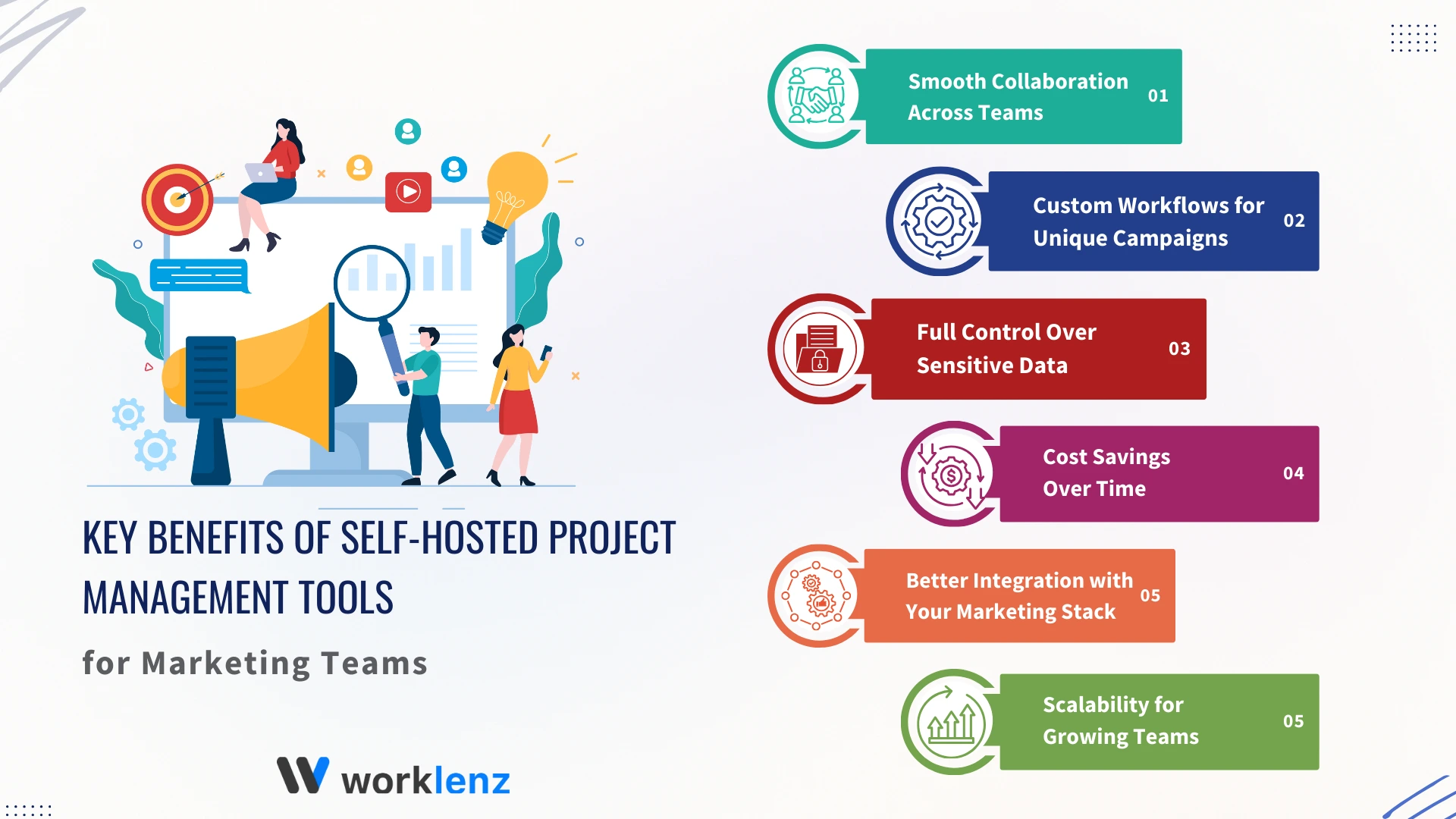How Self-Hosted Project Management Tools Transform Marketing Teams

Your Marketing Team’s Secret Weapon for Campaign Chaos
Every marketing team dreams of the same thing: seamless collaboration, clear deadlines, and campaigns that wow their audience. But let’s be honest—reality rarely looks that polished. Instead, it’s late-night emails, disjointed spreadsheets, missed deadlines, and juggling endless tools that don’t quite fit together.
Now, imagine this: a single, fully customizable tool that works exactly the way your team needs it to while keeping your sensitive campaign data completely in-house. That’s the magic of self-hosted project management tools.
Unlike traditional cloud-based platforms that force you into pre-set workflows, self-hosted tools hand you the keys to create a system as dynamic and innovative as your marketing campaigns. They’re built for teams that don’t just think outside the box—they throw the box away entirely.
In this article, we’ll uncover how self-hosted project management solutions can revolutionize your marketing operations. From turbocharging team collaboration to slashing costs, these tools are more than just software—they’re your marketing team’s new competitive edge. Let’s see why going self-hosted might be the best campaign decision you make this year.
What Are Self-Hosted Project Management Tools?
At its core, a self-hosted project management tool is software that your team installs and manages on its own servers. Unlike cloud-based tools that store your data on third-party servers, self-hosted tools give you full control over how the software works and where your data lives.
This type of setup is perfect for teams that need flexibility. You can adjust the tool’s features, workflows, and integrations to match how your marketing team operates. If you’re working with sensitive campaign data or client information, hosting it yourself also ensures better security and privacy.
For marketing teams, this means no more one-size-fits-all solutions. Instead, you get a system tailored to your campaigns, helping you stay organized and efficient while protecting the data that matters most.
Next, let’s explore the specific ways self-hosted project management tools can make a difference in your marketing operations.
Key Benefits of Self-Hosted Project Management Tools for Marketing Teams
Marketing teams thrive on creativity and collaboration, but managing projects often feels like herding cats. This is where self-hosted tools shine, offering unique advantages that help teams stay organized, efficient, and productive. Let’s break down the key benefits:

1. Smooth Collaboration Across Teams
Marketing projects involve diverse teams—designers, writers, strategists, and analysts—all working together. Without the right tools, communication silos and disjointed workflows can derail progress.
-
Self-hosted tools provide a single platform where everyone can share updates, assign tasks, and collaborate in real time.
-
Marketing managers can oversee everything from campaign planning to final delivery without juggling multiple apps.
Imagine this: your content writer uploads a draft, your designer attaches visuals, and your strategist schedules the launch—all within the same system. This seamless collaboration keeps everyone aligned and on track.
2. Custom Workflows for Unique Campaigns
Marketing campaigns are never one-size-fits-all. A product launch, for example, might require different workflows than a rebranding effort.
-
With self-hosted tools, you can create custom workflows that reflect the specific needs of your campaign.
-
Automate recurring tasks, set up approval stages, and track progress in a way that makes sense for your team.
This adaptability helps marketing teams focus on what they do best—being creative—without getting bogged down in manual processes.
3. Full Control Over Sensitive Data
Marketing teams handle a lot of sensitive information: client details, campaign strategies, and analytics reports. Storing this data on third-party servers can feel risky.
-
Self-hosted tools keep your data on your own infrastructure, reducing the chances of unauthorized access or breaches.
-
This is especially important for agencies managing multiple clients or businesses operating in industries with strict compliance requirements.
Your data stays in your hands, ensuring peace of mind for both your team and your clients.
4. Cost Savings Over Time
Cloud-based tools often come with recurring subscription fees that grow as your team expands. For marketing teams on tight budgets, these costs can add up quickly.
-
Self-hosted solutions typically involve a one-time license fee or are open source, meaning fewer ongoing expenses.
-
You’re free from per-user pricing, making it cost-effective for growing teams.
These savings can be redirected to the things that matter—like boosting ad spend or hiring more talent.
5. Better Integration with Your Marketing Stack
Marketing relies on a suite of tools—from CRMs and analytics platforms to email marketing software. A project management tool that doesn’t integrate well with these systems creates unnecessary friction.
-
Many self-hosted tools are highly adaptable, allowing you to connect them with your existing marketing stack.
-
Sync tasks with your calendar, pull reports from your CRM, or link analytics data directly to your campaigns.
This ensures everything works together, giving your team a clear picture of progress and performance.
6. Scalability for Growing Teams
As your marketing team grows, so do your projects—and the demands on your tools. Self-hosted solutions grow with you,
-
Add new team members without additional costs.
-
Expand features as your campaigns become more complex.
Unlike rigid cloud-based platforms, these tools adapt to your needs at every stage of growth.
Next, we’ll check some popular self-hosted project management tools that marketing teams can use and how to choose the right one for your needs.
Popular Self-Hosted Project Management Tools for Marketing Teams
Not all self-hosted project management tools are created equal. Some are perfect for small marketing teams managing straightforward campaigns, while others are built for complex, multi-channel operations. Let’s take a look at some popular options and what makes them ideal for marketing teams:
1. Worklenz
Designed with flexibility in mind, Worklenz offers marketing teams the tools they need to manage everything from content calendars to event launches.
Key Features: Customizable workflows, robust task tracking, and seamless integration with other marketing tools.
Why It Works for Marketing Teams: Worklenz can adapt to unique campaign structures and ensures sensitive data stays private.
2. OpenProject
A versatile open-source platform, OpenProject is ideal for marketing teams looking for detailed task management and timeline tracking.
Key Features: Gantt charts, time tracking, and collaboration tools.
Why It Works for Marketing Teams: Its easy-to-use interface makes it a favorite for managing campaigns with strict deadlines.
3. Taiga
Perfect for marketing teams embracing agile methodologies, Taiga simplifies the sprint process.
Key Features: Backlog management, customizable boards, and real-time reporting.
Why It Works for Marketing Teams: Agile-friendly tools help teams adapt quickly to changes in campaigns or market conditions.
4. Redmine
A tried-and-true project management tool, Redmine’s simplicity and adaptability make it a strong choice for marketing teams.
Key Features: Role-based access, detailed task tracking, and plugin support for additional features.
Why It Works for Marketing Teams: Redmine’s straightforward setup and support for various plugins let teams tailor it to their needs.
5. Vikunja
Known as the “Swiss army knife” of task management, Vikunja is a lightweight and fast self-hosted tool.
Key Features: Simple UI, kanban boards, and task lists.
Why It Works for Marketing Teams: Vikunja is perfect for smaller marketing teams that need a simple, no-frills solution.
How to Choose the Right Tool for Your Team
When selecting a self-hosted project management tool, consider these factors:
Team Size: Is the tool scalable enough to handle growth?
Features: Does it support marketing-specific needs like campaign workflows, analytics, and content management?
Integration: Can it connect with your existing tools like CRMs, email platforms, or analytics software?
Budget: Is the tool open source, or does it come with licensing fees?
Customization: Will it adapt to your team’s unique workflows?
By choosing the right tool, you can give your marketing team a significant edge, streamlining operations while ensuring full control over your projects.
How to Implement Self-Hosted Project Management Tools in Your Marketing Team
Adopting a self-hosted project management tool may seem like a significant change, but with the right approach, the transition can be seamless. Here’s a step-by-step guide to help your marketing team get started:
1. Assess Your Team’s Needs
Before choosing a tool, identify the challenges your marketing team faces. For example:
-
Are you struggling with disorganized workflows?
-
Do you need better data security for client campaigns?
-
Are recurring software subscription costs becoming a burden?
Understanding these pain points will help you select a tool that aligns with your goals.
2. Choose the Right Tool
Select a self-hosted tool that meets your team’s specific requirements. Look for:
-
Customization: Can it adapt to your marketing workflows?
-
Integration: Will it work seamlessly with your existing tools?
-
Ease of Use: Is it intuitive enough for all team members to adopt quickly?
3. Set Up Your Infrastructure
Since self-hosted tools run on your own servers, ensure your infrastructure is ready. You may need:
-
A dedicated server or cloud hosting solution.
-
IT support for installation and maintenance.
If your team lacks technical expertise, consider partnering with an IT service provider to manage the setup.
4. Customize Workflows and Features
Once installed, tailor the tool to your marketing team’s needs. This may include:
-
Creating project templates for campaigns.
-
Automating repetitive tasks like approvals or reminders.
-
Setting up custom dashboards for progress tracking.
5. Train Your Team
Introduce the tool to your team with clear guidance:
-
Offer training sessions or tutorials on how to use the tool effectively.
-
Highlight its benefits, such as improved collaboration and streamlined workflows.
6. Monitor and Adjust
After implementation, gather feedback from your team:
-
Are they finding the tool helpful?
-
Are there any features they’d like adjusted or improved?
-
Regularly update and refine the system to ensure it continues to meet your team’s needs.
By taking these steps, your marketing team can fully harness the power of a self-hosted project management tool, unlocking new levels of efficiency and creativity in every campaign.
Conclusion: A Smarter Way to Manage Marketing Projects
Self-hosted project management tools aren’t just about managing tasks—they’re about empowering your marketing team to work smarter. By giving you control over workflows, data security, and costs, these tools provide the flexibility needed to tackle even the most complex campaigns.
Whether you’re launching a product, managing a rebranding effort, or juggling multiple clients, self-hosted solutions ensure your team stays organized, collaborative, and creative. For marketing teams looking to future-proof their operations, the choice is clear: self-hosted project management tools are the way forward.
Ready to boost your marketing team’s productivity and take control of your projects?
Try Worklenz– a powerful self-hosted project management solution designed to streamline tasks, enhance collaboration, and provide total control over your data. With Worklenz, you can customize workflows, automate processes, and drive better results for your marketing campaigns. Sign up for a free trial today and experience the difference for yourself!